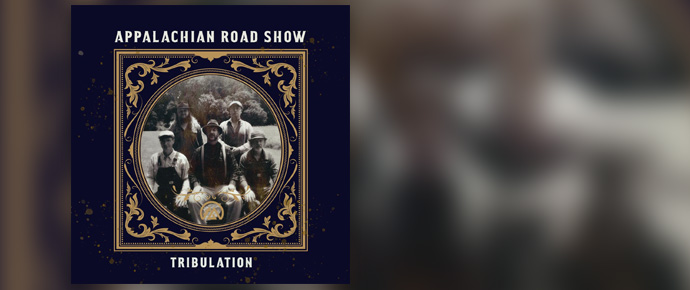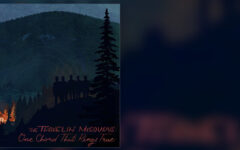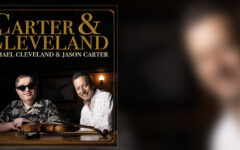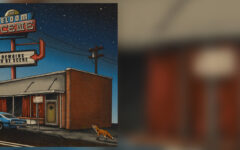
Appalachian Road Show is something of a concept band. They’re not old time, not straightforward bluegrass, but a mixture of the two, with bits and pieces of history thrown in for good measure. Their focus is on the lives, stories, and songs of the people of Appalachia, pulling in songs from a century ago alongside similar-sounding originals and a narrative thread tying everything together. The group’s first album was met with tremendous acceptance from the bluegrass world, leading to several charting songs and a recent stack of IBMA award nominations. Their latest release from Billy Blue Records, Tribulation, continues in the same thread, drawing in listeners for an intriguing trip through, as one narration track refers to it, the “Hardship, Hope, and Enduring Spirit of Appalachia.”
With spoken word tracks interspersed throughout a selection of songs dating back multiple generations, the album feels a bit like the soundtrack to a PBS documentary on Appalachia. But, that’s not a bad thing. The narration is informative and tied directly to the subject matter of the songs surrounding it, and the songs are performed with virtuosic instrumentation and an ear for both the past and the present. There’s little reliance on engineering magic to make the music sound old or antique, and no playing and singing out of tune just because that’s the way the 1930s singer in the hills of Appalachia did it. Plainly put, it’s good stuff.
As the title reveals, many of the songs here focus on adversity and struggles. As many Appalachian scholars will tell you, there’s often a fatalistic bent to the historical people of this region. That fatalism is definitely present here, but often tempered with a bit of hope, as in the traditional song Don’t Want to Die in the Storm, which finds the singer asking the Lord to let him escape from life’s trials while listing others who have “died in the storm.” However, the last verse reminds both the singer and listeners that Jesus can be the solution – “Lord Jesus, he calmed the storm.” The song is also just a cool listen musically, beginning with a mournful a capella recitation and transforming into a old-timey jam near the end.
The narrator of the Civil War-themed Goin’ Across the Mountain also has a touch of hope amongst the sparse, melancholy arrangement, reassuring his wife that though he’s headed to join up with the boys in blue, he’ll be back when the war’s over. This number is from North Carolina banjo player and luthier Frank Proffitt, who shared a number of songs with folksong collectors between the 1930s and 1960s. Wish the Wars Were All Over, on the other hand, jumps headfirst into heartache from the first notes, with its Scots-Irish ballad-style tale of a young woman who won’t rest until she finds her true love, who has left to fight in a war.
More lighthearted is the tongue-in-cheek, Depression-era Sales Tax on the Women, which has a bit of a Stringbean flair (think 20 Cent Cotton and 90 Cent Meat) and a fun bass part near the end. Jim Van Cleve’s original Goin’ to Bring Her Back, which was also the album’s first single, is on the brighter side with a cheerful, relentless narrator whose enthusiasm for the woman he loves is matched by the straightforward traditional bluegrass accompaniment. Also in the bluegrass vein is the familiar 99 Years and One Dark Day, sung capably and vigorously by Darrell Webb. Webb completely changes modes for the following track, a sober cut of Stephen Foster’s Hard Times Come Again No More that serves nicely as a summary of sorts for the album.
Closing the album is an experience that is probably unfamiliar – and even a bit shocking – to anyone who’s never visited a Baptist church deep in Appalachia. Fire and brimstone preaching from the late Rev. Jasper Davis on the Biblical book of Revelation leads into Tribulations, a song about the end times prophecies foretold in that same book. Written by Grayson County, Virginia, native Estil C. Ball, it’s stirring and moving, even with the stark arrangement. Those who seek out Ball’s original 1959 recording will find that the band has included Ball’s mountain diction in their version.
It’s hard to approach reviewing this album as if it were a simple bluegrass release, because it’s not. It has been thoughtfully and purposefully put together to make a statement about life in an often misinterpreted (and often disregarded) region of our country. Having a master’s degree in Appalachian Studies myself, listening and writing this, at times I’ve felt like I was back in college. I’ve stopped to research where the songs came from and what their meanings are more than I’ve focused on the banjo and guitar playing, and I feel like that will be true for many listeners.
If you’re not from Appalachia, take the time to learn about it from Appalachian Road Show and their source material. Yes, the music is good – excellent, really – but the content itself is what truly shines. With this second release, it’s safe to say that Barry Abernathy, Darrell Webb, Jim Van Cleve, Todd Phillips, and Zeb Snyder are well on their way to carving a new niche in traditional music.
For more information on Appalachian Road Show, visit their website. Their new album is available from several online music retailers.







